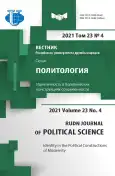The Role of Civic Identity in the Evolution of Relations Between Serbian and Croatian Civil Societies
- 作者: Djokic A.1, Pichelin G.1,2
-
隶属关系:
- Peoples’ Friendship University of Russia (RUDN University)
- Sciences Po Bordeaux
- 期: 卷 23, 编号 4 (2021): Identity in the Political Constructions of Modernity
- 页面: 675-691
- 栏目: IDENTITY IN EUROPE AND ITS ACTORS
- URL: https://journal-vniispk.ru/2313-1438/article/view/322102
- DOI: https://doi.org/10.22363/2313-1438-2021-23-4-675-691
- ID: 322102
如何引用文章
全文:
详细
For decades, Croats and Serbs lived together in a common political construction: Yugoslavia. It is difficult to date the appearance of animosity between Croats and Serbs. Nevertheless, two events proved particularly traumatic for their relations. The Second World War, when the Ustasha led a genocide against the Serbs, and the 1991-1995 war, when the two sides fought a merciless civil war. This article examines the evolution of relations between Serbian and Croatian civil societies from the beginning of the Yugoslavian project to 2021 and how the rise of civic identity in the future might help the process of reconciliation. The main hypothesis of the article is that the failure to construct a viable Yugoslavian civic identity in the past is the cause of ethnic tensions during the 90s. The article entails both qualitative and quantitative methods through which the authors offer explanations about the failure to construct a common Yugoslavian civic identity, how this failure impacted the relations between Serbian and Croatian civil societies, and, finally, what are the prospects of reconciliation and constructing civic identities in the newly formed countries of Serbia and Croatia. Today, relations between the two civil societies remain tense. Serbs in Croatia and Croats in Serbia are subject to unsystematic discrimination, which hinders exchanges between the two countries. This study shows that Serbian and Croatian citizens under 35 years of age, mainly agree that tensions exist. Nevertheless, two-thirds of those questioned in Serbia and three-quarters of those questioned in Croatia believe that reconciliation is possible. This reconciliation becomes even more realistic since an overwhelming majority in both groups want reconciliation.
作者简介
Aleksandar Djokic
Peoples’ Friendship University of Russia (RUDN University)
编辑信件的主要联系方式.
Email: dzhokich_a@pfur.ru
ORCID iD: 0000-0003-1897-5642
MA in Political Sciences, Lecturer Assistant of the Department of Comparative Politics
Moscow, Russian FederationGuillaume Pichelin
Peoples’ Friendship University of Russia (RUDN University); Sciences Po Bordeaux
Email: pichelin.guillaume@gmail.com
ORCID iD: 0000-0001-8679-9391
MA in Political Sciences, Peoples’ Friendship University of Russia (RUDN University) and Sciences Po Bordeaux
Moscow, Russian Federation; Bordeaux France参考
- Beljo, A. (1985). Yugoslavia, genocide, a documental analyses. Sudbury (Conn.), Northern Tribune, 49-65.
- Bjelajac, M., & Žunec, O. (2009). The War in Croatia, 1991-1995. In C. Ingrao & T.A. Emmert (Eds.), Confronting the Yugoslav controversies: A scholars’ initiative (pp. 231-270). Central European Studies Series Purdue University Press.
- Calic, M. (2009). Ethnic cleansing and war crimes, 1991-1995. C. Ingrao & T.A. Emmert (Eds.), Confronting the Yugoslav controversies: A scholars’ initiative (pp. 115-151). Central European Studies Series Purdue University Press.
- Garde, P. (1999). Life and Death of Yugoslavia. Fayard. (In French).
- Hobsbawm, E. (1993). What is an ethnic conflict? Actes de la recherche en sciences sociales, 100, 51-57. (In French).
- Jackson, R.L., & Hogg, M.A. (2010). Encyclopedia of identity. SAGE Publications.
- Kocovic, B. (1985). Victims of World War II in Yugoslavia (pp. 31-41). Biblioteka Nase delo, Londres, Sarajevo. (In Serbian).
- Mitrović, M. (2003). Ethnic cleansing of Serbs from Zagreb 1992-1994 - according to oral history. Tokovi istorije, (3-4), 89-98. (In Serbian).
- Mujanovic, J. (2018). Hunger and fury: The crisis of democracy in the Balkans. Oxford University Press.
- Pirotte, G. (2018). Definition of civil society. Paris: La Découverte, Repères. (In French).
- Ramet, S. (2007). The Dissolution of Yugoslavia: Competing Narratives of Resentment and Blame. Südosteuropa, 55, 30-40.
- Stokes, G. (2009). Independence and the fate of minorities, 1991-1992. In C. Ingrao & T.A. Emmert (Eds.), Confronting the Yugoslav controversies: A scholars’ initiative (pp. 83-112). Central European Studies Series Purdue University Press.
- Tanner, M. (2001). Croatia: A nation forged in War. New Haven, CT: Yale University Press.
- Wachtel, A., & Bennett, C. (2009). The Dissolution of Yugoslavia. In C. Ingrao & T.A. Emmert (Eds.), Confronting the Yugoslav controversies: A scholars’ initiative (pp. 12-47). Central European Studies Series Purdue University Press.
补充文件









